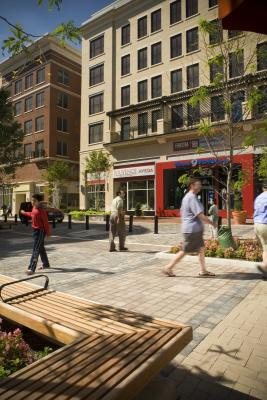
The real estate market is undergoing the most rapid period of change in a generation -- and the shift is decidedly urban. A succession of recent studies have found there is an under-supply of urban-style housing -- attached and small-lot, single-family homes -- on the scale of about 13 million units. On the other hand, there is an estimated oversupply of detached housing in the car-based suburbs of about 28 million units.
Public policy hasn't quite caught up with the market, say the experts at the Congress for the New Urbanism. The Federal Housing Administration and its subsidiaries, Fannie Mae and Freddie Mac, are discouraging urban-style housing developments.
HUD lending standards dictate that the total value of mixed-use development projects can't be more than 15 to 20 percent retail. Fannie caps retail share at 20; Freddie at 25 percent. And these standards set the tone for the private market -- a tone that is consequently skewed toward single-family housing, and away from the pent-up demand for urban development with walkable amenities.
"It’s really disrupting the market," said John Norquist, president of Congress for the New Urbanism. "It’s making it hard to developers to finance good projects."
CNU is seeking reform. The organization has built a broad coalition including the National Association of Homebuilders, the National Association of Realtors, the National Town Builders Association, and the Center for Neighborhood Technology. Together, this reform group is planning to initiate discussions with Shaun Donovan, secretary of the Department of Housing and Urban Development; Rep. Barney Frank (D-MA), of the House Committee on Financial Services; and the U.S. Treasury.
"Our sweetest dream is that the Obama administration -- the Treasury Department and HUD -- would say, 'Let’s change this before the end of the year,'" Norquist said. "The secretary of HUD, Shaun Donovan, has said very favorable things about this. He recognizes it."
Norquist says the 20 percent limit on retail is the result of a 1944 regulation meant to reflect the "increased risk" in the development of projects with multiple uses. The regulation single-handedly set off a massive flight of capital from the country's main streets, according to Norquist.
The policy was misguided from the start. Mixed-use development can actually help minimize risk for lenders. For example, in a traditional Main Street-type building, an apartment might sit atop a plumbing shop. In a bad year for the apartment, the plumbing shop might perform well, helping the building owner minimize losses. It's the old concept of diversification, applied to real estate.
"What we're attacking is the whole logic that urbanism is a risk factor," said Norquist. "If you look at the risk factor right now, the urban and more-compact development is doing better than separate-use sprawl."
CNU and its coalition groups are asking for the retail limit to be raised to 45 percent for mixed-use developments. They're gearing up for a meeting with federal officials in September, at which they plan to make their case.
Meanwhile, they are working to build more partnerships, reach out to more federal leaders and help promote a market-based approach.
"FHA and HUD reinforced this whole movement for single-use zoning," said Norquist. "It hurts the economy. It's bad environmentally. It hurts the efficiency of America."





